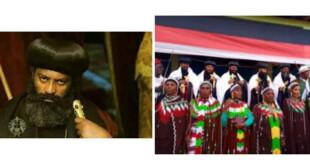The Ethiopian government is killing the Oromo students because they are peacefully protesting against the current policy of the Ethiopian regime’s land stealing policy without due regards to the Oromo people’s well being and livelihood.
The current Ethiopian regime’s policy constitute ethnic cleansing and genocide in the guise of development. We the Oromos are questioning development for whom for what purposes. If the State is killing innocent people who are voicing their concern peacefully, who is the development for?
we ask the Rt Hon David Cameron the British Prime minister to intervene to stop supporting the current Ethiopian brutal regime financially and cut of diplomatic relations immediately, until the regime stops committing systematic genocide and ethnic cleansing.
We the Oromo political exiles allover the world urge the British government to put pressure on the current Ethiopian regime who is pursuing a cunning and systematic destruction of the Oromo people to steal their land.
The British government has a moral and international legal duty to not to cooperate with the current Ethiopian brutal regime who is perpetuating genocidal land policy.
According to Human Rights Watch, at least three students were killed and hundreds were injured across the region as security forces used excessive force to disperse student protesters. Other reports put the number of students killed up to ten. Although protesters are primarily university students, in some instances, high school and primary school children were also reportedly involved in intense confrontations with government forces.
At least nine students were killed by government forces in May 2014 while protesting over the same issue.
The persecution of Oromo people
The students argue that the controversial plan, known as “the Master Plan”, to expand Addis Ababa into Oromia state would result in mass evictions of farmers mostly belonging to the Oromo ethnic group.
It wouldn’t be the first time the government has uprooted members of an ethnic group. Thousands of ethnic Amharas in western Ethiopia were expelled from the country’s Benishangul Gumuz region in 2013 in what critics called “ethnic cleansing”.
The students have other demands such as making Oromo a federal language. Oromo, the language of the Oromo people, is the most widely spoken language in Ethiopia and the fourth largest African language. However, it is not the working language of the federal government.
According to Ethiopian Constitution, Oromia is one of the nine ethnically based and politically autonomous regional states in Ethiopia. Oromo people make up the largest ethnic group in Ethiopia. However, the group has been systematically marginalized and persecuted for the last 24 years. By some estimates, there were as many as 20,000 Oromo political prisoners in Ethiopia as of March 2014.
A 2014 Amnesty International report on repression in the Oromia region noted:
Between 2011 and 2014, at least 5000 Oromos have been arrested based on their actual or suspected peaceful opposition to the government. These include thousands of peaceful protestors and hundreds of opposition political party members. The government anticipates a high level of opposition in Oromia, and signs of dissent are sought out and regularly, sometimes pre-emptively, suppressed. In numerous cases, actual or suspected dissenters have been detained without charge or trial, killed by security services during protests, arrests and in detention.
The ruling elite of Ethiopia are mostly from the Tigray region, which is located in the northern part of the country.
Social media fills in the gaps
Even as the Ethiopian drought and impending food crisis makes a rare appearance in local—and some international—headlines, little attention is being paid to the student protests in Ethiopian media. But despite Ethiopia’s highly controlled online environment and the government’s firm grip on communications infrastructure, social media users are reporting on the issue, particularly on Facebook, with additional coverage coming from diaspora-based media.
One Facebook user, for example, hoped for the world to hear stories of the student protesters’ inspiring actions:
The silence has truly been deafening. We need to see and hear the inspiring actions undertaken by huge numbers of #Oromo in #Ethiopia. Tell their story, enable the world to be swept up in their story.Considering the complete absence of freedom to criticize the government or report opposition stories from within the country, people around the world reading about it can help greatly by doing everything possible to amplify this story.
Another Facebook user, Aga Teshome, took note of the political power of Oromo youth:





